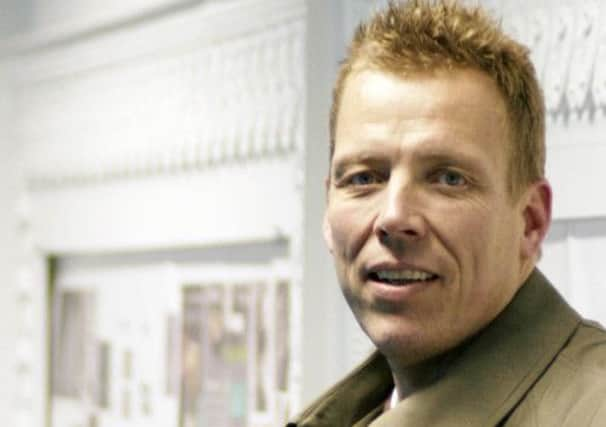Logistik spots a gap in the auto sector as it defies the downturn


According to managing director Dirk Mischendahl, Leeds-based Logistik has managed to keep growing by achieving commercial returns for its clients during the worst slump in decades.
The company delivers “brand and customer experiences” for some of the world’s biggest companies.
Advertisement
Hide AdAdvertisement
Hide AdMr Mischendahl, a former car mechanic, hotel worker and psychology student, founded Logistik in 1996 with a team of four, based in a tiny office above what used to be the Town and Country Club in Leeds.
Born in Germany and raised in Australia, Mr Mischendahl began his working life in his father’s auto parts and spares shop.
Mr Mischendahl settled in Yorkshire after winning a place at Leeds University to study psychology.
Today, Logistik has strategic communications, events, design, video, web and digital teams under one roof at its Leeds HQ.
Advertisement
Hide AdAdvertisement
Hide AdOver the last decade, Logistik has become known nationally for organising events such as the London premiere and after show party for Be Cool, the film based on Elmore Leonard’s pulp novel.
John Travolta, the film’s biggest star, told the Logistik team that he rated the party as one of the best he had attended.
The company’s recent work has included creating a new “employer brand” for Harrods. The company has also devised a strategy to communicate the brand values of Kopparberg cider, and carried out work on Marks & Spencer’s retail conference.
Other high profile projects have been completed on behalf of Millie’s Cookies and Bauer Media.
Advertisement
Hide AdAdvertisement
Hide AdMr Mischendahl was bullish about Logistik’s prospects, after studying the firm’s latest full year results.
He said: “We did about £13.75m (turnover) and something in the region of £750,000 net before tax. That’s about £50,000 up on the year before.”
He described the company’s staffing situation as “stable”. It has 104 staff. Before the financial crisis of 2008, it had around 140 employees.
Mr Mischendahl said: “If there’s a positive to take out of a recessionary period, (it’s that) you start to look internally at your own business.
Advertisement
Hide AdAdvertisement
Hide Ad“What I’m interested in is how much difference I’m making for our customers, and how they’re improving as a result.
“There was one big retailer, who as a result of a communication event we did with them, had their best fourth quarter on record.
“Our staple clients, like retail, will always be there.
“Areas for our growth are around the automotive and consultancy side of the business.
“There’s an opening in the automotive market that has been closed off for so long. However, because there’s a need to be more efficient, they’re opening doors and letting people in.
Advertisement
Hide AdAdvertisement
Hide Ad“If you come with a great service, and a great product, you’re likely to get in.”
Mr Mischendahl highlighted the fact that Logistik had achieved “great success” in financial services, and the importance of focusing on your core business.
“It’s easier to make a sale with an existing client, than it is to get new clients,” he said.
“There still has to be that focus around not being complacent, and really delivering a service they feel happy about with the existing clients.
Advertisement
Hide AdAdvertisement
Hide Ad“Right now I feel opportunities are abundant. But if you’re not careful, you see so many opportunities that you dilute them.
“What also happens in a recession is that the pool (of competition) gets smaller, because people go bust. Just a few weeks ago, one of our competitors went into receivership.
“It’s very sad, but if fuels your desire not to be in that position.”
Mr Mischendahl said Logistik’s business was about “engaging with people”.
Advertisement
Hide AdAdvertisement
Hide AdHe added: “We start off by understanding the culture of a business.
“A lot of the consultancy work is about customer insight, internal strategies, and how you communicate with your internal audience.
“They (the consultants) work with people on a very personal basis, and understand the issue they want to resolve.
“It’s about understanding what the challenges are, and then maybe connecting them with other people who are facing similar challenges in different areas.”
Advertisement
Hide AdAdvertisement
Hide AdMr Mischendahl is passionate about mentoring and helping staff to develop.
“One of the old sayings, that I believe wholeheartedly, is that great businesses are made of great people,” he said.
“If you don’t go after them, they go somewhere else. Work is such a big part of your life. You’ve got to enjoy it.
“And if you don’t enjoy it, don’t do it.
“There are a number of people I talk to and mentor in order to give them business advice, which I enjoy doing.
“I don’t think attracting the right staff is ever easy.
Advertisement
Hide AdAdvertisement
Hide Ad“There are a lot of people out there who want jobs, but you’ve got to make sure they fit with the culture of the business.
“We’re lucky in that we’ve picked up some great people by recommendation.”
Mr Mischendahl is a passionate supporter of sustainable event management initiatives, which ensure major events don’t harm the environment.
Northern lights up the art world
DIRK Mischendahl, the founder of Logistik, is a great believer in the ability of art to inspire, inform and educate people.
Advertisement
Hide AdAdvertisement
Hide AdHe was one of the driving forces behind the development of the Northern Art Prize, which has become an eagerly awaited event on the arts calendar.
It attracts entrants from across the North of England who want to make their mark. It was founded by Mr Mischendahl with support from Leeds conceptual artist Pippa Hale, and Leeds Council’s art director Catherine Blanshard in 2007.
Speaking in 2010, Mr Mischendahl said he believed the prize and the supporting exhibition at Leeds Art Gallery, would prove to be his greatest legacy.